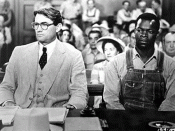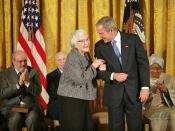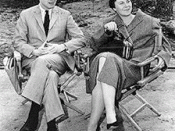Growth Through Grievance In To Kill a Mockingbird by Harper Lee, Scout experiences intellectual and emotional growth through the influence of the people around her and the experience she gains. Scout is a young girl who is very clever for her age, but is simply to young to understand the complexity of the society around her. One accusation, which crossed an invisible racial line that everyone knew was present, brought out the deep-rooted prejudice within a small southern county. Maycomb might have appeared very peaceful and calm before Tom Robinson was brought under trial, but racial tensions were not buried deep under the surface. In To Kill a Mockingbird, Scout Finch recalls a part of her childhood that would definitely change her life. The events that occur during the beginning of the novel may seem somewhat insignificant, but they are actually important in preparing her for the Tom Robinson trial.
During this event, she must maintain composure in the midst of evident injustice that she cannot understand in her youth and innocence. Throughout the novel, Scout observes intense racism and injustice that she must deal with, but she ultimately uses it to become a stronger person. The way children are raised affects the way they act and the person they become. Morals and manners are established at a very young age and often stay with them to adulthood. Scout is lucky to be raised by an intelligent and morally dependable father. Atticus is the most influential person in her life. He is a very mature man who is able to cope with the social problems existing in the community. Atticus' main attribute is the fact that he has high moral value and this is instilled in Scout. When faced with the task of defending Tom, Atticus is sure that he must base it on justice and not let the color of Tom's skin effect his performance. One of the most important lessons he teaches Scout is that she must try to be sympathetic and understanding towards the problems faced by other people. Atticus explains to her that, "You never really understand a person until you consider things from his point of view"ÃÂuntil you climb into his skin and walk around in it"ÃÂ (30). This helps Scout to deal with the many characters she encounters during the course of the novel.
The idea of seeing someone else's point of view is essential to Scout's understanding of her neighbors within the town. By getting to know people whom she had previously just heard rumors about, Scout learns valuable lessons. Her first impression of Mrs. Dubose was a hateful and nasty old lady. This might have been a just assumption after her crude insults of Atticus, but Jem and Scout were unaware of the problems she had been going through. Atticus later informed them that she was dieing and wished to break free of her addiction to morphine. He calls her ""æthe bravest person I ever knew"à(112). Scout learns that the bravest thing a person can do is to try their best knowing that they will lose. When Mr. Dolphus Raymond offers Scout and Dill a drink, Scout immediately objects because she believes it is whiskey. Dill takes a sip and realizes it is only Coca-Cola in the sack. He soon explains to them that he only pretends to be an alcoholic because it helps people to understand why he lives with the African Americans. Scout is puzzled why as to why he would make himself out to be a drunk, but is fascinated nonetheless. From Mr. Raymond, she learns to not judge anyone from rumors, but to understand them from their own perspective.
The lessons that Scout learned from her father along with other members of Maycomb were necessary to prepare Scout for her father's fight to save Tom Robinson's life from the racism and prejudice that were common in the town. This would most likely be one of the hardest challenges of her life. Scout had to watch as Atticus fought as hard as he could for justice, but he never really had a chance. As Miss Maudie put it, ""æAtticus Finch won't win, he can't win, but he's the only man in these parts who can keep a jury out so long in a case like that"à(216). This shows Atticus' courage and bravery in defending Tom Robinson to the best of his abilities, but this is not enough to suffice her shock after the guilty verdict. She cannot comprehend how prejudice could turn a group of reasonably smart people into people who are able to ignore all their intellect and sense of justice. According to Atticus, "There's something in our world that makes men lose their heads "àthey couldn't be fair if they tried"æ. They're ugly, but those are the facts of life"à(220). Since Scout is young and part of a new generation, she will be able to contribute to breaking down racial barriers. Through understanding and an open-mind, Scout can continue the work of her father with the help of the lessons she learned during her childhood.
Scout's experiences that she narrates in To Kill a Mockingbird, contribute to her maturation and understanding of the society she lives in and the society she hopes to live in. As a young child it is hard to for Scout to deal with the problems of the world, but the in the world she would want to live in, justice would always prevail and Boo Radley could be left alone in peace if he desired. Her experiences during the Tom Robinson trial in addition to her other experiences in Maycomb may seem to be only painful. In contrast, these experiences actually strengthened young Scout so that she might be able to fight for what she believes in as an adult. The theme of understanding affected me the most in this novel. Atticus was able to understand all types of people including Bob Ewell, a man who hated him with a passion. This made Atticus a much stronger person than Bob Ewell who was unable and unwilling to extend his views beyond his confined beliefs. Scout had to reach out to understand people like Boo Radley, Mrs. Dubose, Walter Cunningham and Mr. Dolphus Raymond. By "walking around in their skin,"ÃÂ Scout learned a great deal about them and this made her a more complete person. If everyone were as understanding and open-minded as Atticus and Scout Finch, I believe justice would always prevail.





